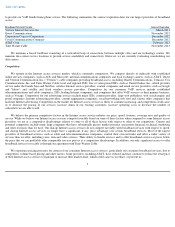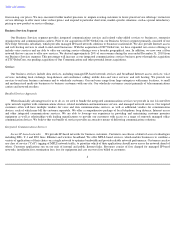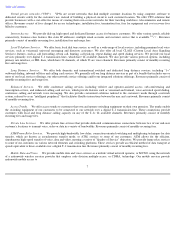Earthlink 2010 Annual Report Download - page 19
Download and view the complete annual report
Please find page 19 of the 2010 Earthlink annual report below. You can navigate through the pages in the report by either clicking on the pages listed below, or by using the keyword search tool below to find specific information within the annual report.
Table of Contents
in which facilities-
based local carriers charge other carriers, such as VoIP providers and wireless providers, for the origination and termination of
local communications traffic. The FCC's review of these matters will not only re-
examine the rules governing the way carriers charge one
another, but also the potential effect that changes to the intercarrier compensation regime could have on various federal subsidy programs such
as the Universal Service Fund, on the nation's legacy carrier network infrastructure, and on consumers' retail rates.
Multiple proposals to reform the entire intercarrier compensation regime have been submitted to the FCC by various industry groups since
the proceeding was initiated. The most recent rulemaking puts forward a mix of proposals, alternatives and analysis, asking for more input on the
framework and potential overhauling of intercarrier compensation and universal service. However, the FCC has not yet enacted a prospective
reform of intercarrier compensation. In addition, the FCC has repeatedly declined requests to declare whether under existing law interstate
interexchange traffic that originates in IP format and terminates in circuit-switched or time-
division multiplexing format is subject to higher
switched access charges or lower reciprocal compensation rates. As a result, individual courts and state regulatory commissions have been
addressing the issue in the context of individual collection disputes, with inconsistent results.
Special Access.
Special access is a service offered by incumbent local telephone companies that consists of dedicated transmission
facilities or private lines used by wireline and wireless telecommunications carriers, Internet-based service providers and large enterprise end-
users. We rely on the purchase of special access services for "last mile" access to many of our customers' locations. As a result, the price of
special access services must be available at rates that allow us to price our retail offerings to meet our gross margin expectations while remaining
competitively priced in the retail market. Incremental increases in the prices of special access services will exert pressure on our gross margins.
Since special access services are not subject to the unbundling requirements of the Communications Act, the prices for special access services
have not been directly affected by the FCC's modification of network unbundling rules. To the extent, however, that the availability of UNE
digital T1 lines may have served as a restraint on the prices charged for special access services, we could face increased prices for special access
services given the limited alternative means of last mile access in some larger central offices resulting from application of the current unbundling
rules.
In 1999, the FCC adopted rules that enable incumbent carriers to obtain pricing flexibility for their interstate special access services in
various metropolitan areas depending on the level of competition present in an area. We purchase interstate special access services from
incumbent carriers in many metropolitan areas where pricing flexibility has been granted. Depending on the degree of pricing flexibility for
which the incumbent carrier qualifies in particular areas, the incumbent carrier may be entitled to impose contracts with minimum revenue
commitments and bundles of purportedly discounted and non-
discounted services that, in effect, enable the carrier to charge substantially greater
prices for special access services in those areas, while making it more difficult for competitive carriers to offer substitute services. In some cases,
the FCC has granted petitions by the incumbent carriers for forbearance from any regulation of some special access services.
As a result of the mergers of BellSouth, SBC and AT&T, and of MCI and Verizon, the number of providers of competitive access services
has diminished. The FCC and the Department of Justice placed conditions on the AT&T and Verizon mergers to constrain the ability of AT&T
and Verizon to raise prices on their wholesale special access and equivalent retail services. These regulatory pricing constraints have now
expired. AT&T and Verizon are free to realign charges for special access services with current commercial rates. Because a substantial portion
of our services are generated through the use of special access lines purchased from AT&T and Verizon, a significant increase in the price for
special access could substantially increase our cost of services.
15
























